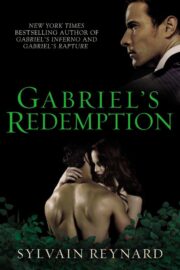“I didn’t know, either.” He kissed his daughter’s head. “In fact, I was just disagreeing with St. Paul.”
“Oh?” She wiped away a tear. “And what did he say in response?”
Gabriel caught her eye. She grinned.
“I told him that the greatest virtue isn’t charity; it’s hope. I discovered charity with Richard and Grace, but also with you. And it helped me through some very dark days. I also discovered faith, when I went to Assisi. But without hope, I wouldn’t be here. I would have taken my life. Without divine intervention in the form of a teenage girl in a Pennsylvania orchard, I’d be in Hell and not sitting at your side holding our daughter.”
“Gabriel,” she whispered, the tears flowing.
“Charity is a great virtue, and so is faith. But hope means the most to me. This is hope.” He gestured to the baby girl on his chest, swaddled in white and wearing a tiny knit cap.
Gabriel’s prayers of thanks were spontaneous and heartfelt. Here, in this room, he had an embarrassment of riches—a pretty, intelligent wife, who had a very large and giving heart, and a beautiful daughter.
“This is the culmination of all my hopes, Gabriel.” Julia reached out to him and he strained to catch her pinky finger with his own. “This is my happy ending.”
He looked to the future with hope and saw a house ringing with the laughter of children and the sounds of small feet running up and down stairs. He saw Clare with a sister and brother, one adopted, one not.
He saw baptisms and first communions and his family sitting with him in the same pew, Mass after Mass, year after year. He saw skinned knees, and first days of school, prom dates and graduation from high school, broken hearts and happy tears, and the joy of introducing his children to Dante, Botticelli, and St. Francis.
He saw himself walking Clare down the aisle at her own wedding, and holding his grandchildren in his arms.
He saw himself growing old with his beloved Julianne and holding hands with her in their orchard.
“Now my blessedness appears,” he whispered, holding his wife’s hand and Clare Grace Hope as she slept peacefully on his chest.
Fin.
Acknowledgments
I am indebted to the late Dorothy L. Sayers, the late Charles Williams, Mark Musa, my friend Katherine Picton, and The Dante Society of America for their expertise on Dante Alighieri’s The Divine Comedy, which informs my work. In this novel, I’ve used the Dante Society’s conventions of capitalization for places such as Hell and Paradise.
I’ve been inspired by Sandro Botticelli’s artwork and the incomparable space that is the Uffizi Gallery in Florence. The cities of Oxford, Florence, Assisi, Todi, and Cambridge lent their ambience, along with the borough of Selinsgrove.
I’ve consulted the Internet Archive site for its version of Dante Gabriel Rossetti’s translation of La Vita Nuova along with the original Italian. In this work, I’ve cited Henry Wadsworth Longfellow’s translation of The Divine Comedy.
I am grateful to Jennifer for her feedback and support. This book would not exist without her encouragement and friendship. I am grateful also to Nina for her creative input and wisdom. And I owe a special debt to Kris, who read an early draft and offered invaluable constructive criticism at several stages. Thank you.
I’ve enjoyed working with Cindy, my editor at Berkley, and I look forward to working with her on my next two novels. Thanks are also due to Tom for his wisdom and energy in navigating my transition to Berkley. And thanks to the copyediting, art, and design teams who worked on this book.
My publicist, Enn, works tirelessly to promote my writing and to help me with social media, which enables me to stay in touch with readers. I’m honored to be part of her team.
I would also like to thank those who have offered encouragement, especially the Muses, Tori, Erika, and the readers who operate the Argyle Empire and SRFans social media accounts. Special thanks are also due to Elena, who assisted in specifying the Italian pronunciation for the audiobooks. John Michael Morgan did a magnificent job reading Gabriel’s Inferno and Gabriel’s Rapture.
Finally, it is no great secret that I intended to end the story of the Professor and Julianne with Gabriel’s Rapture. Thank you to everyone who wrote to me asking that their story be continued. Your continued support, and the support of my family, is inestimable.
—SR
Ascension 2013
About the Author
Sylvain Reynard is a Canadian writer with an interest in Renaissance art and culture and an inordinate attachment to the city of Florence. (Parenthetically, it should be noted that the snarky narrator of Gabriel’s Redemption was contracted to write this biographical description, and he can attest that SR is, in fact, real, and has an enviable collection of argyle socks).


"Gabriel’s Redemption" отзывы
Отзывы читателей о книге "Gabriel’s Redemption". Читайте комментарии и мнения людей о произведении.
Понравилась книга? Поделитесь впечатлениями - оставьте Ваш отзыв и расскажите о книге "Gabriel’s Redemption" друзьям в соцсетях.